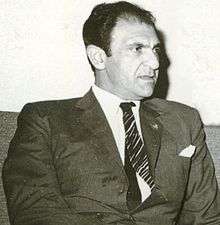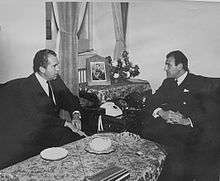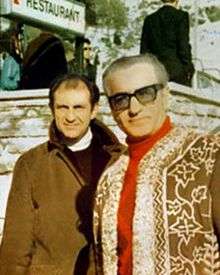Ardeshir Zahedi
| Ardeshir Zahedi | |
|---|---|
 | |
| Minister of Foreign Affairs | |
|
In office 12 January 1966 – 12 September 1971 | |
| Monarch | Mohammad-Reza Pahlavi |
| Prime Minister | Amir-Abbas Hoveida |
| Preceded by | Abbas Aram |
| Succeeded by | Abbas Ali Khalatbari |
| Ambassador of Iran to the United States | |
|
In office 7 March 1973 – 11 February 1979 | |
| Preceded by | Amir-Aslan Afshar |
| Succeeded by | Mehdi Haeri Yazdi |
|
In office 16 March 1960 – 3 March 1962 | |
| Preceded by | Ali Gholi Ardalan |
| Succeeded by | Hossein Ghods-Nakhai |
| Personal details | |
| Born |
16 October 1928 Tehran, Iran |
| Political party | Rastakhiz Party |
| Spouse(s) | Shahnaz Pahlavi (m. 1957–d. 1964) |
| Relations | Fazlollah Zahedi (Father) Khadija tol-Moluk (Mother) |
| Children | Zahra Mahnaz Zahedi |
| Alma mater | Utah State University |
| Religion | Islam |
Ardeshir Zahedi (Persian: اردشیر زاهدی), GCVO, (born 16 October 1928) was an important Iranian diplomat during the 1960s and 1970s, serving as the country's foreign minister and its ambassador to the United States and the United Kingdom.
Early life
Born in Tehran on 16 October 1928, he is the son of General Fazlollah Zahedi, who served as prime minister after the fall of Mohammed Mossadegh.[1] Zahedi received a degree in agriculture from Utah State University in 1950,[2] where he was a member of Kappa Sigma. Seven years later, he married the daughter of the Shah of Iran, Princess Shahnaz Pahlavi; the marriage ended in divorce in 1964.
Political life

Zahedi served as ambassador to the United States from 1960 to 1962 and to the United Kingdom from 1962 to 1966.[3] Under Prime Minister Amir Abbas Hoveida, he served as minister of foreign affairs from 1966 to 1971.

Zahedi again became ambassador to the United States from 1973 until the Iranian Revolution climaxed in January 1979. During his second stint in Washington, he won a reputation for extravagance. In the mid-1970s, Zahedi became known as a companion of the American movie star Elizabeth Taylor, with the two being dubbed "the hottest couple" in Washington D.C., according to the writer Barbara Howar. During the 1977 Hanafi Siege of a federal building in Washington, Zahedi and two other ambassadors from Muslim nations were able to talk the hostage takers into surrendering and releasing 149 hostages.
Over the course of 1978, it was reported in some circles that Zahedi urged the Shah to appease the rioters by making scapegoats of several high-ranking officials, including Amir Abbas Hoveida (then Prime Minister) and SAVAK director Nematollah Nassiri. When the Shah fled Iran in 1979, Zahedi was still serving as ambassador in Washington, but resigned as soon as Khomeini came to power. He started fervent attempts at securing political asylum for the ailing Shah and the Imperial family in Panama, Mexico, Morocco and finally Egypt. He was present at the Shah's death bed and funeral in Cairo in 1980.
Later years
Zahedi is now retired and living in Montreux, Switzerland.[1] He received honorary doctoral degrees of law and humanities from Utah State University, East Texas State University, Kent State University, St. Louis University, University of Texas, Montana State University, Washington College, Westminster College, Harvard University, Chung-Ang University of Seoul, and the College of Political and Social Science of Lima in Peru. In December 1976, in a ceremony held in Washington D.C., Zahedi was awarded the Kappa Sigma Fraternity ‘Man of the Year’ Award. In 2002, he was inducted into to Alumni Hall of Honor of the Utah State University College of Agriculture. He received many awards and honors from nations around the globe for his humanitarian service and record in international affairs.
Views
In an interview in May 2006, Zahedi voiced his support for Iran's Nuclear Program stating it as an "inalienable right of Iran", under the Nuclear Non-Proliferation Treaty (NPT). He told Voice of America that the U.S. approved the start of Iran's $50 billion nuclear program in the 1970s. Two documents in particular, dated 22 April 1975 and 20 April 1976, show that the United States and Iran held negotiations on a nuclear program and the U.S. was willing to help Iran by setting up uranium enrichment and fuel reprocessing facilities.[4]
Honours
National honours
-
._Sash.gif) Order of Humayoun, 1st class (Imperial State of Iran).[5]
Order of Humayoun, 1st class (Imperial State of Iran).[5]
Foreign honours
-
 Honorary Knight Grand Cross of the Royal Victorian Order [GCVO] (United Kingdom).[5]
Honorary Knight Grand Cross of the Royal Victorian Order [GCVO] (United Kingdom).[5]
See also
References
- 1 2 "Biography". Ardeshir Zahedi. Retrieved 6 November 2012.
- ↑ Utah State University USU Alumni= Great Success
- ↑ "State Intelligence". London Gazette (Issue 44249). 14 February 1967. Retrieved 29 November 2013.
- ↑ Linzer, Dafna (27 March 2005). "Past Arguments Don't Square With Current Iran Policy". The Washington Post. Retrieved 2012. Check date values in:
|access-date=(help) - 1 2 Royal Ark
Further reading
- Ardeshir Zahedi, The Memoirs of Ardeshir Zahedi: Volume One [English Language], (ِIbex Publishers). ISBN 978-1-58814-073-9.
- Ardeshir Zahedi, The Memoirs of Ardeshir Zahedi: Volume Two [English Language], (ِIbex Publishers). ISBN 978-1-58814-099-9.
- Ardeshir Zahedi (اردشیر زاهدی), The Memoirs of Ardeshir Zahedi: Volume One [Persian Language] (Khaterat-e Ardeshir Zahedi -خاطرات اردشیر زاهدی), (ِIbex Publishers). ISBN 978-1-58814-038-8.
- Ardeshir Zahedi (اردشیر زاهدی), The Memoirs of Ardeshir Zahedi: Volume Two [Persian Language] (Khaterat-e Ardeshir Zahedi -خاطرات اردشیر زاهدی), (ِIbex Publishers). ISBN 978-1-58814-065-4.
- 'Alí Rizā Awsatí (عليرضا اوسطى), Iran in the past three centuries (Irān dar Se Qarn-e Goz̲ashteh - ايران در سه قرن گذشته), Volumes 1 and 2 (Paktāb Publishing - انتشارات پاکتاب, Tehran, Iran, 2003). ISBN 964-93406-6-1 (Vol. 1), ISBN 964-93406-5-3 (Vol. 2).
- Fereydoun Hoveyda, The Fall of the Shah, translated by Roger Liddell (Wyndham Books, New York, 1980). ISBN 0-671-61003-1, ISBN 978-0-671-61003-6.
- "The 38 Hours: Trial by Terror". Time magazine. 21 March 1977.
External links
| Wikisource has original works written by or about: Ardeshir Zahedi |
- Zahedi Family Web Site
- Zahedi Family Web Site: Ardeshir on Duty
- Zahedi says Nixon approved start of Iran's $50 billion nuclear program in 1973 on YouTube, Voice of America, 2006.
- Ambassador Zahedi's full interview on YouTube, Voice of America, 2006.
- Ardeshir Zahedi interviews